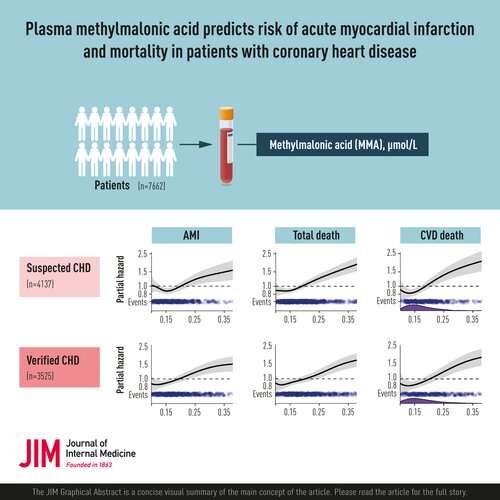This article has been reviewed according to Science X's editorial process and policies. Editors have highlighted the following attributes while ensuring the content's credibility:
fact-checked
peer-reviewed publication
trusted source
proofread
Elevated plasma methylmalonic acid is related to increased cardiovascular events: Study

A recent study from UiB shows that elevated plasma methylmalonic acid predicts increased risk of acute myocardial infarction and mortality in patients with suspected or verified coronary heart disease.
Methylmalonic acid (MMA) is a substance produced from the breakdown of amino acids, odd-chain fatty acids and cholesterol in the body. MMA concentration in blood is reported to be elevated in patients with heart diseases and kidney impairment, and higher plasma MMA is considered a marker of vitamin B12 deficiency.
"In our study, we analyzed the association of plasma MMA with the risk of acute myocardial infarction and death in 7,662 participants of two large, independent cohorts of patients evaluated for either suspected coronary heart disease or verified coronary heart disease," says lead author, Indu Dhar at the University of Bergen.
They found that across both cohorts higher MMA in plasma was associated with reduced renal function and low B12 status at baseline. However, higher plasma MMA predicted increased long-term risk of acute myocardial infarction and total and cardiovascular deaths independent of renal function and B12 status.
"This may suggest that risk relationship between MMA and outcomes is not explained by vitamin B12 status or kidney function alone," says Dhar.
Another important finding findings from this research was the positive association between plasma MMA and risk of dying due to non-cardiovascular causes primarily in patients evaluated for suspected coronary heart disease, thus warranting further research to explore MMA in a wider perspective beyond cardiovascular diseases.
"Future studies should also investigate the potential role of MMA as an important regulator of energy and lipid metabolism," Dhar concludes.
More information: Indu Dhar et al, Plasma methylmalonic acid predicts risk of acute myocardial infarction and mortality in patients with coronary heart disease: A prospective 2‐cohort study, Journal of Internal Medicine (2023). DOI: 10.1111/joim.13610


















